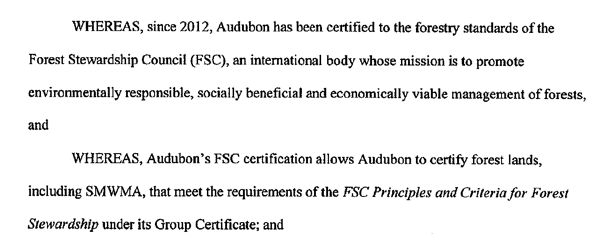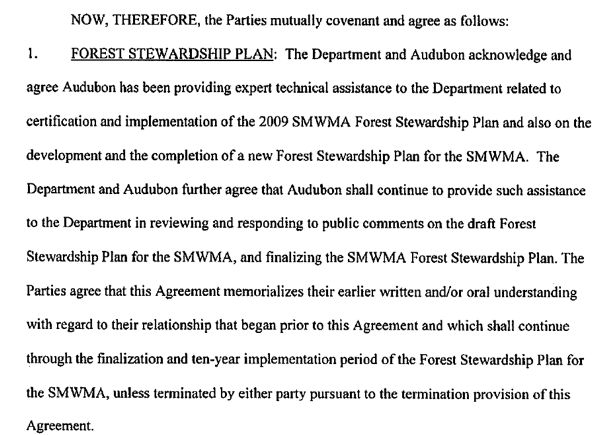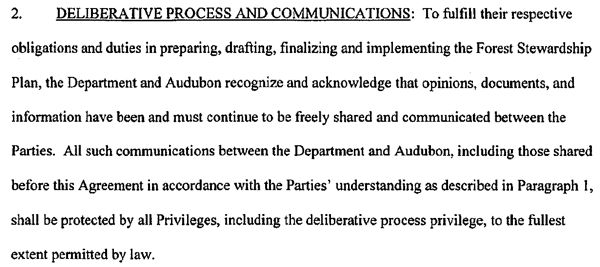Christie DEP Abusing OPRA to Cover Up Privatization Of Planning, Financing, and Management Of Public Lands
DEP and NJ Audubon Deal Would Keep All Documents Secret and Exempt From OPRA
Dark Money From Special Interests and Wall Street Billionaires Finance Public Lands Management
This whole Sparta Mountain controversy continues to get dirtier by the day.
NJ Sierra Club just released what amounts to a secret Memorandum of Agreement (MOA) between the Christie DEP and NJ Audubon (NJA) regarding planning and management of Sparta Mountain Wildlife Management Area (SMWMA), including plans to commercially log the forest under the guise of “forest stewardship”.
The local news coverage “Sierra Club says Sparta Mountain agreement keeps info from public” misses the implications, so let me explain.
DEP – Audubon Deal Is A Recipe For Privatization of the Control Over Public Lands That Must Be Stopped
The MOA was executed on July 6, 2016 and was not subject to any public participation or opportunity for public review and public comment.
Despite an ongoing enormous controversy and strong opposition by conservationists to the DEP and NJA proposed expansion of logging plans for SMWMA and significant press coverage of that debate, neither DEP or NJA publicly disclosed the existence of the agreement. There was no press release or public announcement regarding the MOA.
The MOA would abdicate DEP’s public duties and legal responsibilities to manage public lands in the public interest in accordance with transparent and accountable open public processes and in compliance with DEP regulations and standards, to a private entity bound by private Forest Stewardship Council (FSC) standards and planning procedures.
This gives NJA unaccountable control of the technical content of forest plans for public lands.
The kind of illegal delegation of DEP’s powers to a private entity is exactly why Governor Christie correctly vetoed a bill that would have done that.
The Governor’s CV stated the following:
“This bill requires the Department of Environmental Protection (“DEP”) to establish a forest stewardship program for State-owned lands. I commend the bill’s sponsors for their efforts to address this important environmental issue. I agree that it is in the public interest to establish a program for the responsible stewardship of forests on State-owned lands to promote the long-term health and vigor of New Jersey’s forests.
My sole concern with the bill is the requirement that DEP abdicate its responsibility to serve as the State’s environmental steward to a named third party. According to the Office of the Attorney General, this constitutes an improper delegation of Executive Branch authority in violation of the Constitution.” [emphases mine]
The MOA would delegate to NJA exactly the DEP powers the AG determined were “an improper delegation of Executive Branch authority in violation of the Constitution.”
Ironically, the bill the Gov. correctly vetoed as an illegal delegation of DEP powers required that forestry plans obtain DEP permits and regulatory approvals and be consistent with the Highlands Act, indirectly triggering public participation requirements (see section Section 4 of S1085 SCS)
4. a. The State Forester shall: [(1) – (3)]
(4) ensure that all required permits and approvals are obtained for any forest stewardship activities conducted pursuant to a forest stewardship plan adopted for State-owned lands;
(5) ensure that the implementation of forest stewardship plans on State-owned lands located in the Highlands Region is consistent with the provisions of the “Highlands Water Protection and Planning Act,” P.L.2004, c.120 (C.13:20-1 et al.);
Ironically, the DEP powers Governor Christie was so concerned about in his Veto are not only implicitly and explicitly delegated to NJA and FSC by the MOA, they are totally absent from the MOA.
The MOA is silent on any requirements to secure DEP permits and requirements to comply with the Highlands Act.
If logging on state lands were forced to comply with DEP water quality standards, stream buffers, wetlands and Highlands Act preservation area requirements, it could not be done. Period. Perhaps those are the real reasons Gov. Christie vetoed the forestry bill and the delegation issue was just a pretext.
The MOA would allow private “dark money” – including private contributions from a Wall Street billionaire – to finance the planning and management of public lands:
Under the MOA, DEP would deny public OPRA requests for all documents, including those necessary to determine who was paying for the preparation of forestry plans if that money were laundered through NJA.
We’ve already seen a billionaire owner of a hunting club – with special interests in a specific kind of forest management that maximizes game species – provide $140,000 to NJ Audubon to develop the Sparta Mountain plan.
Donald Trump entered into a partnership with NJ Audubon to manage his golf course – what would stop a secret contribution to manage public lands?
What’s to stop the forest products industry from funding NJA plans, without any public awareness?
On to top off all these abuses, the MOA attempts to keep all this secret! That is done in two ways, both of them an outrageous abuse of law and public policy.
First, the MOA would require the explicit consent of both DEP and NJA before any document could be released publicly – either of who could withhold consent to veto the public release of information, and for no reason at all:
Second, and even worse, the MOA would keep all documents and communications between NJ DEP and NJA secret by exploiting a loophole under OPRA known as the “deliberative privilege” exemption:
The Christie DEP is clearly abusing OPRA to keep secret all information, documents and public records regarding the planning and management of Sparta Mountain, including commercial logging there – conduccted by a private entity, funded by private interests, and subject to private standards.
Even the recent FSC Audit of NJ Audubon and DEP’s prior Sparta Mountain forest management found significant con-compliance with minimal FSC “Stakeholder” consultation process requirements/
FSC Stakeholder consultation is FAR LESS involved than full DEP regulatory public participation requirements, which include public notice, opportunity for public review of the entire administrative record, minimum 30 day public comment period, public hearings, DEP response to public comment, and administrative and judicial appeal rights. FSC has NONE OF THAT. NONE.
Even worse, FSC allows NJ Audubon to select the friendly “stakeholders, just like DEP does in “by invitation only” Stakeholder meetings.
If DEP can get away with this abuse, it virtually privatizes and institutionalizes a secret planning process for public lands.
In part 2, we will talk about parallels with 2 recent high profile controversies:
1) Successful OPRA litigation by the NJ ACLU over the Zuckerberg $100 million contribution to Newark Schools, and
2) the recent debacle by the Christie DEP’s attempt to use private group NJ Future to secretly and privately plan for the commercialization and privatization of Liberty State Park.




